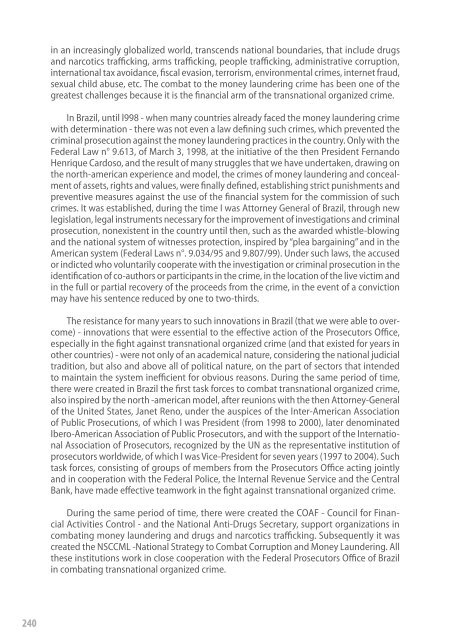TEMAS DE COOPERAÇÃO INTERNACIONAL
5I60JN6pE
5I60JN6pE
You also want an ePaper? Increase the reach of your titles
YUMPU automatically turns print PDFs into web optimized ePapers that Google loves.
in an increasingly globalized world, transcends national boundaries, that include drugs<br />
and narcotics trafficking, arms trafficking, people trafficking, administrative corruption,<br />
international tax avoidance, fiscal evasion, terrorism, environmental crimes, internet fraud,<br />
sexual child abuse, etc. The combat to the money laundering crime has been one of the<br />
greatest challenges because it is the financial arm of the transnational organized crime.<br />
In Brazil, until l998 - when many countries already faced the money laundering crime<br />
with determination - there was not even a law defining such crimes, which prevented the<br />
criminal prosecution against the money laundering practices in the country. Only with the<br />
Federal Law n° 9.613, of March 3, 1998, at the initiative of the then President Fernando<br />
Henrique Cardoso, and the result of many struggles that we have undertaken, drawing on<br />
the north-american experience and model, the crimes of money laundering and concealment<br />
of assets, rights and values, were finally defined, establishing strict punishments and<br />
preventive measures against the use of the financial system for the commission of such<br />
crimes. It was established, during the time I was Attorney General of Brazil, through new<br />
legislation, legal instruments necessary for the improvement of investigations and criminal<br />
prosecution, nonexistent in the country until then, such as the awarded whistle-blowing<br />
and the national system of witnesses protection, inspired by “plea bargaining” and in the<br />
American system (Federal Laws n°. 9.034/95 and 9.807/99). Under such laws, the accused<br />
or indicted who voluntarily cooperate with the investigation or criminal prosecution in the<br />
identification of co-authors or participants in the crime, in the location of the live victim and<br />
in the full or partial recovery of the proceeds from the crime, in the event of a conviction<br />
may have his sentence reduced by one to two-thirds.<br />
The resistance for many years to such innovations in Brazil (that we were able to overcome)<br />
- innovations that were essential to the effective action of the Prosecutors Office,<br />
especially in the fight against transnational organized crime (and that existed for years in<br />
other countries) - were not only of an academical nature, considering the national judicial<br />
tradition, but also and above all of political nature, on the part of sectors that intended<br />
to maintain the system inefficient for obvious reasons. During the same period of time,<br />
there were created in Brazil the first task forces to combat transnational organized crime,<br />
also inspired by the north -american model, after reunions with the then Attorney-General<br />
of the United States, Janet Reno, under the auspices of the Inter-American Association<br />
of Public Prosecutions, of which I was President (from 1998 to 2000), later denominated<br />
Ibero-American Association of Public Prosecutors, and with the support of the International<br />
Association of Prosecutors, recognized by the UN as the representative institution of<br />
prosecutors worldwide, of which I was Vice-President for seven years (1997 to 2004). Such<br />
task forces, consisting of groups of members from the Prosecutors Office acting jointly<br />
and in cooperation with the Federal Police, the Internal Revenue Service and the Central<br />
Bank, have made effective teamwork in the fight against transnational organized crime.<br />
During the same period of time, there were created the COAF - Council for Financial<br />
Activities Control - and the National Anti-Drugs Secretary, support organizations in<br />
combating money laundering and drugs and narcotics trafficking. Subsequently it was<br />
created the NSCCML -National Strategy to Combat Corruption and Money Laundering. All<br />
these institutions work in close cooperation with the Federal Prosecutors Office of Brazil<br />
in combating transnational organized crime.<br />
240


